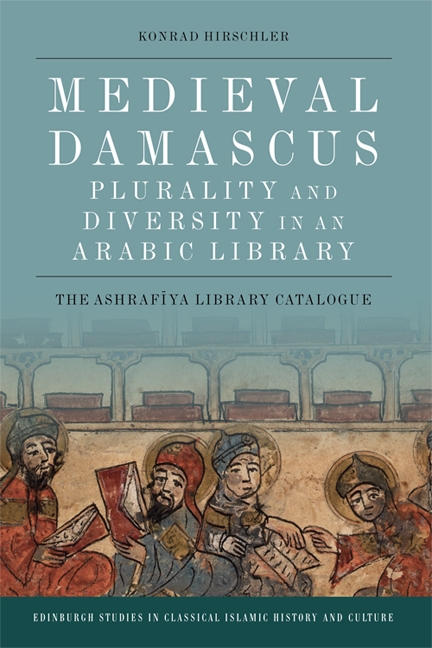Book contents
- Frontmatter
- Contents
- List of Illustrations
- Acknowledgements
- Introduction
- 1 The Making and Unmaking of a Medieval Library
- 2 Organising the Library: The Books on the Shelves
- 3 Plurality and Diversity: The Profile of a Medieval Library
- 4 The Ashrafīya Catalogue: Translation and Title Identification
- 5 The Ashrafīya Catalogue: Edition
- Bibliography
- Index of Subjects
- Index of Titles
- Index of Authors
- Index of External Categories
4 - The Ashrafīya Catalogue: Translation and Title Identification
Published online by Cambridge University Press: 05 August 2016
- Frontmatter
- Contents
- List of Illustrations
- Acknowledgements
- Introduction
- 1 The Making and Unmaking of a Medieval Library
- 2 Organising the Library: The Books on the Shelves
- 3 Plurality and Diversity: The Profile of a Medieval Library
- 4 The Ashrafīya Catalogue: Translation and Title Identification
- 5 The Ashrafīya Catalogue: Edition
- Bibliography
- Index of Subjects
- Index of Titles
- Index of Authors
- Index of External Categories
Summary
This chapter presents the data contained in the Ashrafīya catalogue in a standardised form. The central challenge in preparing this list, and in working with medieval book lists and catalogues in general, is the identification of titles. In many cases this is a straightforward endeavour, as titles are given with a reasonable degree of detail and are sufficiently well known: an entry such as Adab al-dīn wa-al- dunyā (On Conduct in Religious and Worldly Matters) by al-Māwardī is unequivocal and requires no further research. Easily identifiable titles are especially found whenever al-Ansārī provides the author's name, which is the case for almost half of the catalogue's entries (965). In these cases modern reference and overview works such as the Encyclopaedia of Islam, Baghdādī's Ī∂āa al-maknūn, Sezgin's Geschichte des arabischen Schrifttums, al-Ka hhāla's Muʿjam al-Mu ʾallifīn, Brockelmann's Geschichte der arabischen Litteratur and al-Ziriklī's al-A ʿlām are generally sufficient if combined with early modern bio-bibliographical works such as Oājjī Khalīfa's Kashf al-Ounūn as well as subject-specific and author-specific works such as Ullmann's Die Medizin im Islam, Gutas's Avicenna and the Aristotelian Tradition, Pellat's Nouvel essai d’inventaire de l’oeuvre ĞāaiOienne and Alwajī's Muʾallafāt Ibn al-Jawzī. However, in many other cases the identification is far from straightforward and rather resembles, as quoted in the Introduction, a fiendish species of crossword. In these cases the information on the author is generally absent and the title given poses particular problems. From my experience of working with the Ashrafīya catalogue and other medieval book lists, the titles of these problematic cases broadly fall into four main categories: the generic title, the popular title, the ‘book-in- the- making’ title and the key word title.
The first category of generic titles includes entries such as Multiple-Text Manuscript with Poems and Reports (Majmūʿ ashʿār wa-akhbār), Stories, Poems and Anecdotes (Akhbār wa-ash ʿār wa-nawādir) and Persian Correspondence (Tarassul ʿajamī).
- Type
- Chapter
- Information
- Medieval Damascus: Plurality and Diversity in an Arabic LibraryThe Ashrafiya Library Catalogue, pp. 133 - 441Publisher: Edinburgh University PressPrint publication year: 2016



